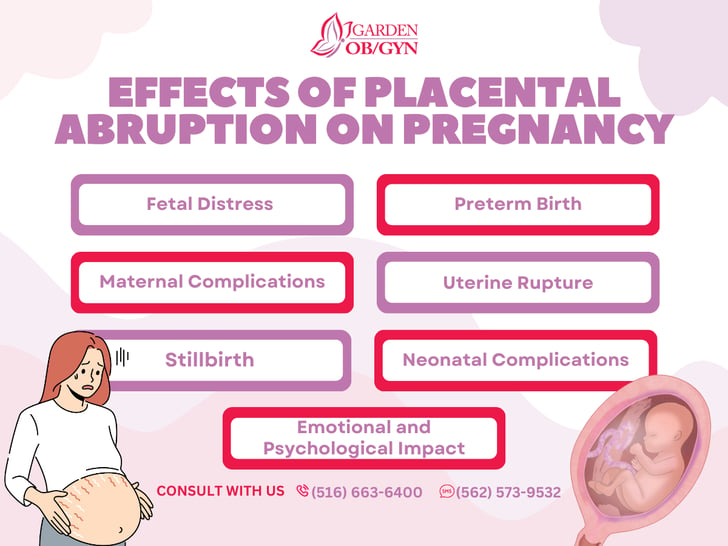Effects of Placental Abruption on Pregnancy
Delving into the effects of placental abruption is crucial for comprehending the gravity of this condition and guiding appropriate medical interventions.

Pregnancy is a remarkable journey marked by the anticipation of new life, but it can also bring unexpected challenges. Placental abruption is a serious complication that can have profound effects on both the mother and the developing fetus. Delving into the effects of placental abruption is crucial for comprehending the gravity of this condition and guiding appropriate medical interventions.
-
Fetal Distress: Placental abruption jeopardizes the essential connection between the mother and the fetus, leading to a compromised supply of oxygen and nutrients. This deprivation can result in fetal distress, manifested through abnormal heart rate patterns, decreased fetal movement, and distressing changes in fetal monitoring.
-
Preterm Birth: In many cases, placental abruption prompts early delivery as a protective measure for both the mother and the baby. Premature birth comes with its own set of challenges, including respiratory difficulties for the newborn, developmental concerns, and an increased risk of long-term health issues.
-
Maternal Complications: Placental abruption poses significant risks to the mother's health. Excessive bleeding or hemorrhage is a common complication, potentially leading to shock and necessitating emergency medical interventions. In severe cases, a cesarean section may be required to safeguard the mother and facilitate the delivery of the baby.
-
Uterine Rupture: The forceful separation of the placenta from the uterine wall can cause trauma to the uterus, leading to uterine rupture in some cases. Uterine rupture is a life-threatening complication that requires immediate medical attention and intervention.
-
Stillbirth: In the most severe cases of placental abruption, where there is a substantial loss of blood supply to the fetus, the outcome can be devastating—stillbirth. This tragic event underscores the urgency of early detection, intervention, and vigilant monitoring of pregnancies at risk for placental abruption.
-
Neonatal Complications: Babies born after placental abruption may face various health challenges. The degree of complications depends on the severity of the abruption and the gestational age at delivery. Neonatal complications can include respiratory distress syndrome, intraventricular hemorrhage, and long-term developmental issues.
-
Emotional and Psychological Impact: Experiencing placental abruption can take a toll on the emotional well-being of both parents. The trauma of a potentially life-threatening event, coupled with the loss of a child in severe cases, can lead to profound grief, anxiety, and depression. Mental health support is crucial for individuals and families navigating these challenging circumstances.
Placental abruption is a serious and potentially life-threatening complication that demands prompt medical attention and comprehensive care. The effects of placental abruption extend beyond the physical realm, encompassing emotional and psychological dimensions as well. Prenatal care, vigilant monitoring, and timely interventions are key to minimizing the impact of placental abruption on both maternal and fetal well-being. As medical research advances, the hope is to further refine detection methods and treatment strategies, offering a brighter outlook for pregnancies affected by this complex condition.
































